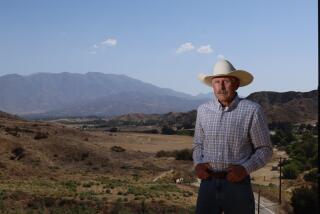Lomita Plan to Rezone PCH Draws Fire
From their wood-frame house on a dead-end street in Lomita, Harvey and Lucille Stephens have watched for 42 years as the neighborhood changed around them.
The transformation has been gradual, Harvey Stephens said, as “beer joints, cheap motels and junkyards” along Pacific Coast Highway have given way to small businesses, mini-malls and chain motels.
More change may be on the way for residents and business owners around Pacific Coast Highway.
Lomita officials are considering a sweeping plan that would rezone a mile-long stretch of the highway, the city’s main business thoroughfare, from general commercial uses to more retail-oriented ones.
The new ordinance would prohibit businesses such as car washes, auto repair shops and liquor stores, according to a draft prepared by a city-hired consulting firm. New hotels and motels would be required to have a minimum of 50 rooms and a restaurant. Lots would have to be at least 100 feet wide, with a minimum area of 10,000 square feet773866872their current ownership.
Moratorium in Effect
Meanwhile, no new businesses will be allowed on Pacific Coast Highway for the next year, at least.
The city’s efforts to tighten control over development on the highway began in October, 1987, when the City Council passed a moratorium on commercial business there. The council has extended the ban twice, first in January and again this month. The present moratorium will be in effect until October, 1989, said City Clerk Dawn Tomita.
The Planning Commission will hold a study session next week to discuss the ordinance, said Senior Planner Richard Kawasaki.
The consulting firm, Mark Briggs & Associates, has done three reports on development in Lomita since September, 1987, concluding that the city’s present zoning allows a hodgepodge of competing uses in commercial zones.
Councilman Charles Belba said the city’s primary motive is to “slow down and bring growth under control on PCH.”
Current Law ‘Abused’
“We have runaway development on PCH,” Belba said. “Everything and anything is going in, in every fashion and form. The (current) ordinance itself is outdated. . . . People are using and abusing shortcomings in the ordinance, and we feel it’s time to ensure we get some quality commercial construction that’s going to enhance the city.”
The proposed ordinance would also increase the city’s sales tax base, Kawasaki said.
But some small business owners such as Balta Guerrero are upset over the proposed ordinance and say it could change Lomita’s small-town character. They fear that the ordinance would cause many small, family owned stores to lose their leases if the landowner had a chance to sell.
“We’re not against Lomita going forward, but they’re telling us you can’t make a living anymore,” said Guerrero, who has run an auto supply and repair shop on Pacific Coast Highway for 8 2036687218100-foot frontage, but if you look at most of the businesses here, they’re less than 100 feet.”
Randall Witz, whose family has owned an auto supply store on Pacific Coast Highway for nearly 50 years, said he also opposes the ordinance.
“If we let them do this, we’re losing control over what kinds of businesses can be placed here,” Witz said. “What the city really wants on PCH is no repair-type businesses at all. They want retail and sales tax. For every retail sale they generate dollars, but not on labor. But service-oriented business is what made Lomita.”
Traffic Issue
Citizens for a Better Lomita, a group of business owners and residents opposed to the ordinance, argue that it is designed to attract mini-malls and would increase traffic, particularly around three schools near the intersection of Eshelman Avenue: Fleming Junior High School, Eshelman Elementary and a secondary school at St. Margaret Mary Catholic Church.
School officials worry that bigger businesses will mean more traffic.
Tom Devereux, parish administrator at St. Margaret Mary church, said he has told city officials that the church is concerned that increased traffic would pose a greater chance of injury for students and parishioners.
About 33,500 cars a day pass through Lomita on Pacific Coast Highway, said Margie Tiritilli, a spokeswoman for the state Department of Transportation. During rush hour, about 2,800 cars per hour use the street, she said.
The new ordinance would mean even more mini-malls and traffic on the highway, said Mark Hays, a Lomita business owner and organizer of the citizens group.
‘Like to Keep It’
“Lomita has retained a small-town atmosphere mostly because about 50% of development on PCH is no more than 50 feet wide,” Hays said. “We’d kind of like to keep it that way.”
But city officials said some business owners and residents have misunderstood the intent of the proposal.
The ordinance is intended to limit “lesser-producing business to other sections of the city, and to promote retail” business along Pacific Coast Highway, said Senior Planner Kawasaki. The ordinance will not eliminate small business or significantly increase traffic, he argued.
“We already have traffic on PCH caused by commuters,” Kawasaki said. “We’re not going to get rid of them one way or the other. What we would be gaining by promoting retail is perhaps getting folks already commuting through the city to spend some of their money here.”
The city is hiring a consultant to study traffic on Pacific Coast Highway, Belba said.
‘Wouldn’t Have Control’
Mayor Harold Croyts said the property near the Eshelman Avenue schools “has been right next to commercial areas all the time. Right now, without some control, they can put any business in those general commercial areas, and we wouldn’t have control. . . . We’re trying to provide some semblance of organized development along one of our major streets.”
Under the present ordinance, Kawasaki said, “if development started coming in hard and fast, we couldn’t control it to the extent we’d like. . . . More and more we’re starting to recognize that business owners don’t live in Lomita, and not all these guys have Lomita in their best interest.”
The new ordinance would promote the consolidation of small lots, Kawasaki said. However, some business owners argue that the ordinance would lower the property value of lots smaller than the proposed minimum size. It would be difficult to sell nonconforming lots, Guerrero said.
City Councilman Hal Hall, a former Lomita store owner, voted against extending the moratorium for another year and said he would oppose the proposed ordinance in its present form.
Hall said that the moratorium has caused problems and that he would prefer “to go ahead with business as usual and study the situation, make up a new ordinance as we go. Now we’ve got the whole thing tied up for a year.”
But Hall added that residents opposed to the ordinance are “just raising hell. . . . There’s nobody going to be put out of business. There may be some people prevented from going into business.”
Kawasaki also said present Lomita business owners will not be forced to close. “They can stay forever as long as the building is in good shape,” he said.
More to Read
Sign up for Essential California
The most important California stories and recommendations in your inbox every morning.
You may occasionally receive promotional content from the Los Angeles Times.










